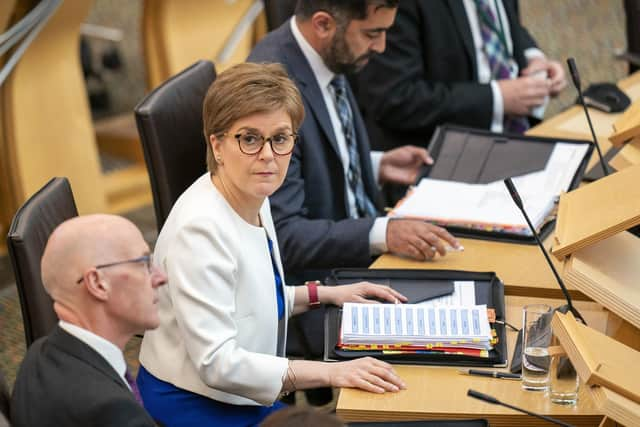What we learned from FMQs: education attainment gap, buffer zones, waiting times and legal representation for victims
The questions ranged from education to health and the justice system – but how did the First Minister respond and who was grilling her on what?
Here is all you need to know about some of the main topics discussed.
Advertisement
Hide AdAdvertisement
Hide AdEducation attainment gap


The Tories and Lib Dems quizzed the Scottish Government over the attainment gap target. The Lib Dems claimed the Government was “at odds” over the target. Education secretary Shirley-Anne Somerville told the Parliament’s education committee last month she would not set an “arbitrary date” for when the attainment gap would be closed. However, Nicola Sturgeon said on Thursday the Scottish Government stood by its 2026 target. Standing up whilst the First Minister was speaking on being proud of improving the numbers of young people from the most deprived communities going to university, former Lib Dems leader Willie Rennie said: “You have some brass neck.”
Anti-abortion buffer zones
A Government approach that began to unravel at FMQs was the Government’s stance on anti-abortion protests. It comes as pressure to act on implementing 150m protest buffer zones outside hospitals and clinics has mounted as anti-abortion protests have increased across Scotland. Ms Sturgeon said it was “her preference” to “legislate nationally” to ensure a “consistency of approach”. In November, women’s health minister Maree Todd told MSPs the Government does not consider that imposing “blanket buffer zones” around “all abortion clinics” would be “appropriate”. An official spokesperson to the First Minister told The Scotsman Ms Sturgeon’s comments are now the stance of the Scottish Government, but “legal complexities” remain which the Government is “looking into”. The spokesperson said Ms Todd is now “in the same position as the FM”. An emergency summit hosted by the FM on anti-abortion protests is expected to happen late this month.
Waiting times
Looking at the clock was a priority for two party leaders today as Douglas Ross struck out at Ms Sturgeon on patient waiting times, while Scottish Labour leader Anas Sarwar focused on mental health waiting times for young people. Ms Sturgeon said despite challenges there were "tentative" improvements as she stressed she’s not shying away from NHS challenges. Mr Ross raised the issue of a woman given a cardiac appointment for July 2024. The First Minister said it was "not acceptable" for that patient to face such a wait and her case was being looked at. Mr Sarwar asked why an eight-year-old with autism “should suffer with no support for almost a year”. The FM said "there is still considerable work to do" to speed up treatment times, citing Covid as being a major factor.
Legal representation for rape victims
The last question at FMQs led to the First Minister agreeing to “consider” a means-tested, legal representation scheme for victims of rape and serious sexual assault before they go to court.
Asked by Labour Pauline McNeil about the issue, Ms Sturgeon said: “Sadly in our society today many survivors of rape and sexual assault are often left feeling under-supported and as if they are somehow the guilty parties.” Ms Sturgeon said there were still backlogs, but the Government was working hard to address this.
Comments
Want to join the conversation? Please or to comment on this article.